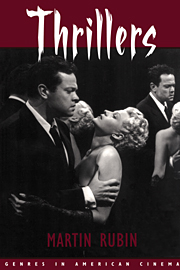Book contents
- Frontmatter
- Contents
- List of Illustrations
- Acknowledgments
- PART I APPROACHES
- PART II HISTORICAL OVERVIEW
- PART III FILM ANALYSES
- 6 The Detective Thriller: The Kennel Murder Case (1933), The Big Sleep (1946)
- 7 The Psychological Crime Thriller: Strangers on a Train (1951)
- 8 The Spy Thriller: Man Hunt (1941)
- 9 The Police Thriller: The French Connection (1971)
- 10 Conclusion
- Notes
- Selected Bibliography
- Filmography/Videography
- Index
8 - The Spy Thriller: Man Hunt (1941)
Published online by Cambridge University Press: 04 December 2009
- Frontmatter
- Contents
- List of Illustrations
- Acknowledgments
- PART I APPROACHES
- PART II HISTORICAL OVERVIEW
- PART III FILM ANALYSES
- 6 The Detective Thriller: The Kennel Murder Case (1933), The Big Sleep (1946)
- 7 The Psychological Crime Thriller: Strangers on a Train (1951)
- 8 The Spy Thriller: Man Hunt (1941)
- 9 The Police Thriller: The French Connection (1971)
- 10 Conclusion
- Notes
- Selected Bibliography
- Filmography/Videography
- Index
Summary
The subject of this chapter is the spy genre, which encompasses the general areas of espionage, international intrigue, and the clandestine side of global conflict - the shadow war that is fought off the battlefield, often in the very midst of everyday life. There has been an especially close link between the spy story and the concept of what is popularly if loosely considered to be a thriller. The few writers who have attempted general overviews of the literary thriller, such as Ralph Harper, Jerry Palmer, and (more implicitly) Michael Denning, concentrate mainly on the spy genre and seem to consider it the archetypal thriller form. One reason for this preeminence of the spy thriller is the breadth of its scope - conspiracy on a global scale, an entire world in the balance, potential enemy agents lurking in every city, street, and building - against which the individual heroism and vulnerability of the protagonist can be more sharply defined. Harper writes, “In the thriller there is always a war on or a war about to go on. … This is the reason why secret agent stories are the touchstones of thriller literature; they represent evil unlimited.”
Like the detective story, the spy story is a genre with a significant literary pedigree. As John G. Cawelti and Bruce A. Rosenberg note in their genre overview The Spy Story (1987), one can trace precedents for the spy story all the way back to Greek mythology.
- Type
- Chapter
- Information
- Thrillers , pp. 226 - 241Publisher: Cambridge University PressPrint publication year: 1999



